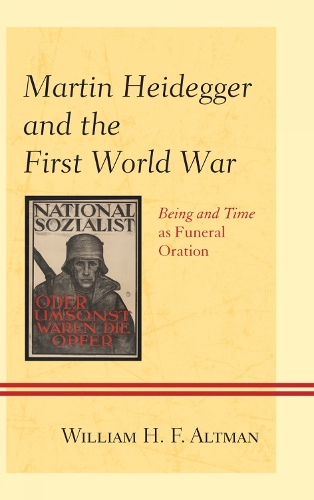
Martin Heidegger and the First World War: Being and Time as Funeral Oration
(Paperback)
Publishing Details
Martin Heidegger and the First World War: Being and Time as Funeral Oration
By (Author) William H. F. Altman
Bloomsbury Publishing PLC
Lexington Books
25th March 2015
United States
Classifications
Professional and Scholarly
Non Fiction
Political science and theory
First World War
Second World War
Modern warfare
European history
193
Physical Properties
Paperback
350
Width 152mm, Height 228mm, Spine 25mm
522g
Description
In a 1934 speech, marking the Twenty-fifth Reunion of his high school class, Martin Heidegger spoke eloquently of classmates killed in the Great War and called on his audience to recognize that the national rebirth now occuring in Hitlers Germany must continue to draw inspiration from the war dead. In this process, he refers to the war of 19141918 as the First World War. Since the condition for the possibility of the First is a Second World War, Martin Heidegger and the First World War raises the question: how could Heidegger have already known in 1934 that another war was coming The answer is to be found by reading Being and Time (1927) as a funeral oration for the warriors of the Great War, a reading that validates Heideggers paradoxical claim that the genuinely historical must emerge from the future. By using Lincolns Gettysburg Address as an archetype of the genre, William H. F. Altman shows that Heideggers concept of temporality in Being and Time replicates the way past, present, and future interweave in the classic funeral oration and argues that if there is a visible path connecting Being and Time to its authors subsequent decision for National Socialism, it runs through the trenches of the Great War and its authors successful attempt to evade them. The analysis and conclusions in this book will be of great value to students and scholars interested in philosophy, history, intellectual history, German studies, and political science.
Reviews
Altmans historical research illuminates important dimensions of Heideggers thought and mentality, and contributes to a richer grasp of the context and meaning of Being and Time. -- Richard Polt, Professor of Philosophy, Xavier University
Altmans scholarship is voluminous, especially regarding material detailing Heideggers personal and professional life. . . .It may also be mentioned that throughout this study, Altman introduces incidental references and allusions to a number of other works by Heidegger, the most noteworthy are the Hlderlin Lectures of 193435 which Altman reads in ways which support his contention that Heideggers prose can readily be connected to themes associated with WWI. For anyone with a special interest in Heideggers readings of poetry, whether Greek or German, the discussions and background material pertaining to Hlderlin are valuable and constitute a suggestive interpretive base for determining the import of Heideggers many writings on this important poet. * ID: International Dialogue, A Multidisciplinary Journal of World Affairs *
William Altman analyzes Heideggers theories in Being and Time against the background of the First World War, on which they depend. This is an important book. -- Tom Rockmore, Duquesne University
Through wide-ranging research combined with meticulous close readings of often overlooked texts, William Altman sheds important new light on Heideggers thought and politics in the historical context of interbellum Germany. Altmans readings will no doubt be controversial, but this book deserves the attention of anyone wanting to make sense of the connections between Heideggers philosophy, his place within the generation of the Great War, and his own eventual engagement with National Socialism. -- Gregory Fried, Suffolk University
In connecting Being and Time with the epideictic genre, and in interpreting it as a funeral oration for the German soldiers fallen during the Great War, William Altman sheds new light on the call for the 'struggle to come' launched by Heidegger in Section 74 of that work, and gives a greater concretenessmartial, so to speakto the Heideggerian conception of the relation between present, past, and future. It is the anticipation of a Second World War that is already in sight. -- Emmanuel Faye, University of Rouen, France
Author Bio
William H. F. Altman teaches Latin and World History at E. C. Glass, a public high school in Lynchburg, Virginia.
